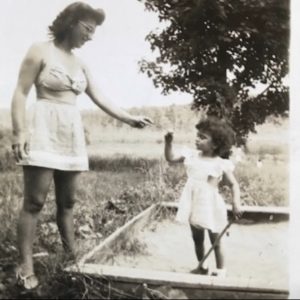I don’t really believe in “ex” friends. There is an ebb and flow to friendships, but once established, they can usually be revived, even if dormant. Some can be intense for a while, then circumstances change – one of the parties moves away, changes jobs, or life interferes (I have seen an instance where politics got in the way; in this polarized world that can certainly happen). But once the basis is established, most can still be friends.
I put up the photo of my childhood birthday party because Debbie Felsot is in it (the girl with her eyes closed). Her birthday is one day after mine and our mothers negotiated which weekend each of us would celebrate our birthdays. We had the same group of girlfriends, lived in the same neighborhood and were quite friendly. Then the family moved away. This would have been around 1960 – long before social media (or a concerted effort for little girls to stay in touch). And, indeed, we lost touch. But I belong to a Facebook group for those who lived in a certain Detroit area code. It seems to be inhabited by folks a bit older than I, though I recognize some of the last names. One that cropped up some years ago was “Ron Felsot”. I messaged him, asking is he was related to Debbie, explaining who I was and why I was interested. He was, indeed, her older brother and gave me her email address. I promptly wrote, sent a current photo and was delighted to be back in touch.
We exchanged a few messages and birthday greetings, then fell out of touch again. It seems, after all those years, we really didn’t have much to say to one another. People do grow up and life moves on. Is she an “ex-friend”? I suppose so. If we lived close to one another, perhaps things would be different, but it did not turn out that way.
For years I have worked on, or chaired my college reunions. So every five years, I would call a long list of friends and catch up. After the Internet came along, I’d email, but that was less personal and I wouldn’t always get a response. For our 40th reunion (now almost 10 years ago), I made a concerted effort to get great turnout and really reconnect to some old friends. And I was successful at both, much to my delight. I got a few friends to show up who had never come before and we’ve stayed in touch.
My Brandeis friends crossed a lot of peer groups and I continued to pestered one fellow (who had never come to any reunions, but I always wanted to stay connected) long after the event, until I finally got a “yes” to meet for lunch. We hadn’t seen each other in over 40 years and had so much fun telling our life stories. We stayed in touch. I was delighted to discover that he had grown into a genuinely nice person, someone I enjoyed speaking with. We’d text or he’d call if he was out and about. So I stayed up-to-date on his life.
Until recently. I know he has been busy, between a big renovation project to his summer home, helping out with the grandkids, other family obligations. I hope that I haven’t done something to aggravate him. He no longer responds to most of my texts (which are not frequent). We do “like” each other’s Instagram posts, but there is not real contact. Does this make him an “ex-friend”? I hope not. It just makes me sad to again not be in close touch. Perhaps we had different expectations for this renewed friendship.
As I said when I began this story, friendships ebb and flow. I guess we are at a low point. I look forward to the time when we are flowing again. We are now in our 70s. The clock is ticking…can’t wait too long!






